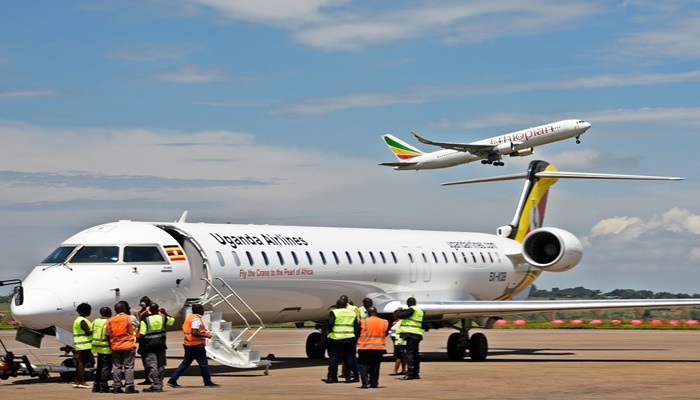Uganda on Tuesday re-launched its national carrier, Uganda Airlines, hoping to take a slice of the East African aviation business that is dominated by Ethiopian Airlines.
Ugandan Airlines Chief Executive Officer Ephraim Bagenda said at a ceremony at Entebbe, the country’s sole international airport, south of the capital Kampala, that the re-launched airline would exceed customer expectations through high quality service.
“We undertake to be a world-class airline that will exceed customer expectations through high quality service.
“The airline will initially fly to seven regional destinations in Kenya, Tanzania, Somalia, South Sudan, and Burundi, Bagenda said, ahead of the inaugural flight to Kenya’s capital Nairobi.
He said that in November, the airline would launch flights to destinations in south and central Africa.
The country is banking on its emerging oil industry and the traditional tourism sector to generate international traffic to sustain the airline.
Although air traffic in Africa is forecast to grow 6% a year, twice as quickly as mature markets, over the next two decades, most state-owned flag carriers on the continent are losing money.
The notable exception is Ethiopian Airlines, which analysts say has avoided the mistakes of other regional carriers and not fallen prey to political interference.
But Uganda Airlines will face stiff competition not only from Ethiopian Airlines, but also from Rwanda and Tanzania which have also poured cash into their flag carriers in the past few years.
Another rival regional carrier Kenya Airways has also faced challenges in its efforts to expand.
It became loss-making in 2014 after buying a number of aircraft which coincided with a slump in tourist and business travel to Kenya blamed on a spate of attacks by Somalia-based Islamist militants.
The airline has not recovered and was re-nationalised in July in what analysts said was a last-ditch effort to save it.
Uganda Airlines, founded by the country’s former dictator Idi Amin in 1976, was liquidated in 2001 during a push to privatise state firms.
Its revival will “reduce the cost of air transport and ease connectivity to and from Uganda,” Prime Minister Ruhakana Rugunda said at the ceremony.
Ugandans spend about $450 million annually on foreign travel and the state-owned airline would help keep some of this cash within the national economy, Rugunda said.
The prime minister said citizens would also benefit from direct flights from their capital over expensive, indirect routes on rival airlines.
The airline received its first two CRJ900 planes from Canadian aircraft manufacturer Bombardier in April. Two more of those planes are expected next month, according to the airline.
It expects to receive an Airbus A330 Neo in late 2020, then a second in early 2021, the CEO told Reuters in July, adding that the two wide-body planes will enable the airline to expand to destinations in the Gulf and China.
Each Bombardier cost around $27 million while the carrier will pay about $110 million for each of the Airbus aircraft.
The airline is wholly publicly funded and forecasts that it will be self-financing after two years, the CEO said in July.
-Reuters/NAN






































